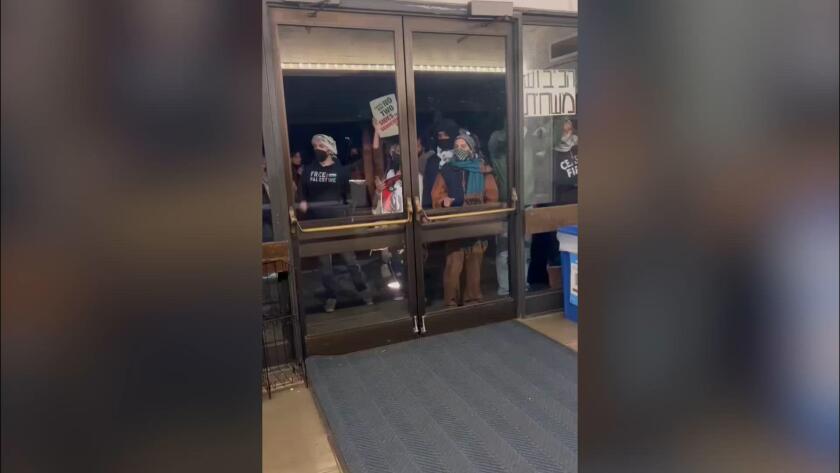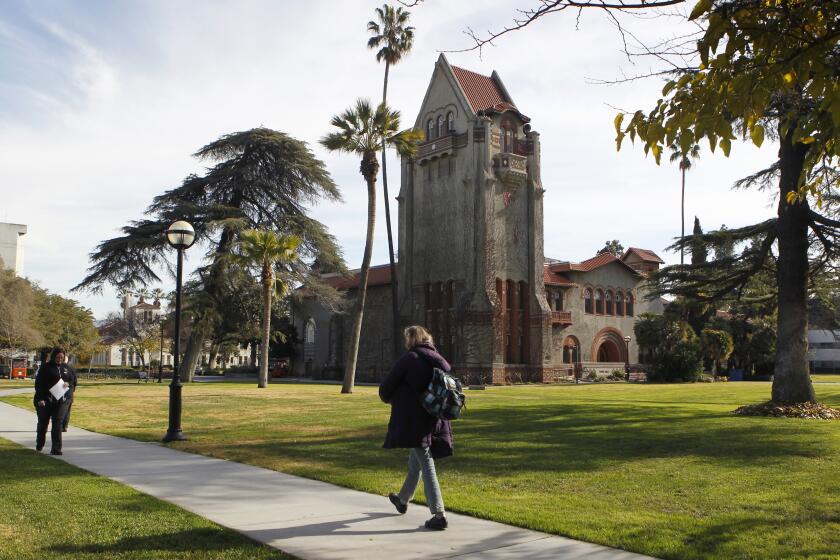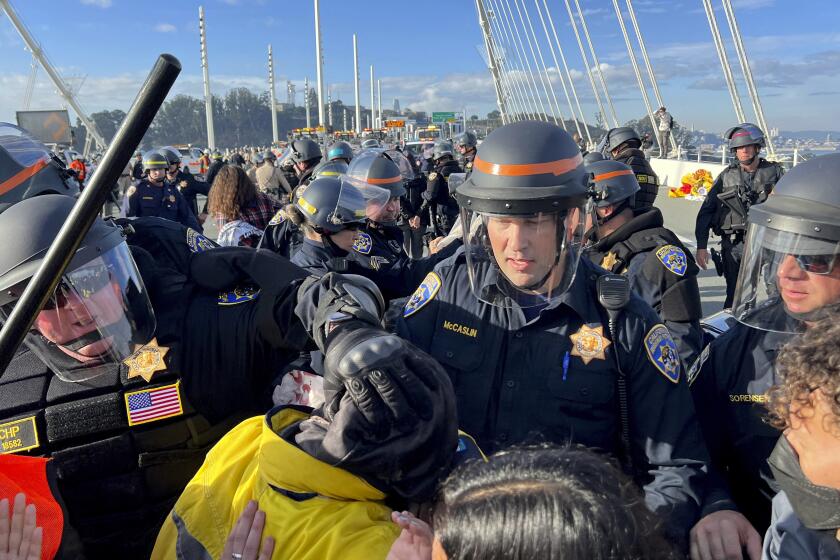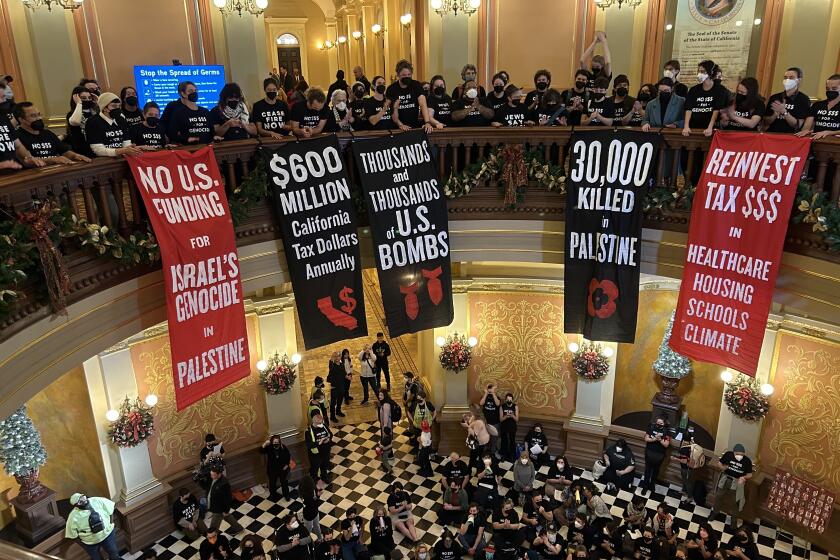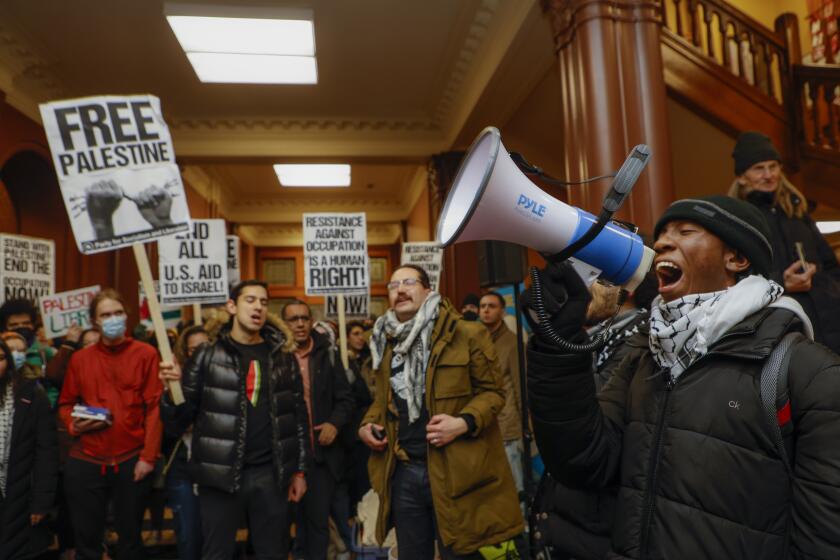Pro-Palestinian protesters shut down event organized by Pro-Israel student groups at UC Berkeley
Students knock on the doors of Zellerbach Playhouse at UC Berkeley on Monday. (Sharon Knafelman)
UC Berkeley police evacuated a private event organized by Jewish student groups after pro-Palestinian demonstrators broke open a door to the building and shattered a window.
At one point, about 200 protesters gathered outside the event site, Zellerbach Playhouse, holding up signs that read, “Stop the genocide,” and at times chanting, “Long live the intifida,” videos posted on social media showed.
University officials called Monday’s incident “appalling” and said police had to cancel the event and escort students to safety because of the number of demonstrators and the threat of violence.
“We had to make that choice between doing what was necessary to let the event go on or protecting the people in the building,” said university spokesperson Dan Mogulof.
In a message sent to university staff and students Tuesday afternoon, UC Berkeley Chancellor Carol Christ and Provost Benjamin E. Hermalin called the incident “an attack on the fundamental values of the university.”
The history professor is accused of grabbing and twisting the arm of a student who tried to block him from videotaping a protest.
The featured speaker at the event was Ran Bar-Yoshafat, an Israeli attorney and former member of the Israeli military. It was organized by Students Support Israel at Berkeley, Bears for Israel and Berkeley Tikvah, said Vida Keyvanfar, co-president of Berkeley Tikvah.
The organizations describe themselves as pro-Israel student groups on the campus.
Messages to Students Support Israel and Bears for Israel seeking comment were not immediately returned.
Since the Oct. 7 attack by Hamas in Israel and subsequent attacks by the Israeli military in Gaza, the university has seen multiple protests on its campus. But Mogulof said Monday’s incident was unlike past incidents.
“We’ve had other demonstrators, but not who were breaking down doors and windows,” he said.
Social media posts encouraging demonstrators to show up to the campus helped increase the turnout outside the event. Mogulof declined to give specific numbers but said police dispatched more officers Monday night than it had to any other protest on campus since Oct. 7.
School officials’ concerns were heightened when they became aware of a social media post by Bears for Palestine, a group on campus, calling for protesters to “shut it down.”
About 250 pro-Palestinian protesters demanding a cease-fire in Gaza shut down westbound lanes of the Bay Bridge, bringing traffic on the crucial route to a halt.
In the post, the group claimed Bar-Yoshafat was invited to “spread settler colonial Zionist propaganda about the very genocide he has participated in” and called demonstrators to show up by 6 p.m.
Messages to the group seeking comment were not immediately returned.
In social media posts, the group noted when the event was moved from one location to Zellerbach Playhouse and posted video of demonstrators marching toward the building, chanting, “Yoshafat, you can’t hide.”
Concerned by the social media posts calling for protests, Keyvanfar said the student organizations met with university administrators before the event and asked for additional support and security.
Keyvanfar, a senior, said she was sitting outside the building and tasked with checking in attendees to the event when she saw a crowd of about 200 protesters headed her way.
“I was very nervous,” she said, “just seeing this huge crowd of people yelling and screaming.”
On the day California lawmakers returned to Sacramento for the new year, hundreds of protesters convened at the state Capitol on Wednesday and shut down the Assembly with calls for Israel to stop its war against Hamas.
As protesters reached the building and attempted to go inside the event, police told Keyvanfar to close her laptop and go inside the building, she said.
“There was spit flying all over the place, people yelling in my face and people videotaping,” she said. “At that point I was getting swallowed by the mob and not being effective at my job.”
Other videos of the incident posted on social media showed protesters banging on closed glass doors.
Keyvanfar said some protesters gained entry to the building when someone opened a side door for students who were helping organize the event. When she tried to close the side door, she said, some of the protesters pulled the door open as she was trying to shut it, yanking her arm and hurting her wrist.
In one video, UC Berkeley Chief of Police Yogananda Pittman is seen taking the microphone in a theater and evacuating the room.
“We are asking all persons to leave,” she says. The seats of the theater appeared mostly empty.
Activists set out to highlight the links between Black and Palestinian liberation. They dredged up a historic dispute over an antisemitic cartoon.
In the statement to the university, Christ and Hermalin confirmed the building was evacuated “to protect the speaker and the members of the audience.”
“We want to express our deep remorse and sympathy to those students and members of the public who were in the building, fearing for their safety,” the statement read. “We deeply respect the right to protest as intrinsic to the value of a democracy at an institution of higher education. Yet, we cannot ignore protest activity that interferes with the rights of others to hear and/or express perspectives of their choosing. We cannot allow the use or threat of force to violate the First Amendment rights of a speaker, no matter how much we might disagree with their views.”
School officials said no one was treated for injuries at the scene and no arrests were made. Still, UC Berkeley officials said they are reaching out to staff and students and urging them to let the university know if they were injured.
Keyvanfar said she and other students believe Bears for Palestine bore responsibility for the protest because of its call to action. She said she’s filed a police report and there have been complaints filed with the university.
She said she’s hoping Monday’s incident will shed light on some of the concerns Jewish students have regarding some of the protests on campus regarding the war in Gaza.
“I think that Jewish students are sometimes misunderstood and when a Jewish student says, ‘I’m fearing for my safety,’ that it’s often misinterpreted as, ‘I don’t like the activism that’s happening,’ ” she said. “If the student is feeling unsafe, that needs to be addressed.”
Since the Monday incident, Mogulof said, the university has received multiple messages from staff, students and the community expressing concerns about the incident and its potential to lead to other violent incidents.
“We’re taking those messages to heart,” he said.
More to Read
Sign up for Essential California
The most important California stories and recommendations in your inbox every morning.
You may occasionally receive promotional content from the Los Angeles Times.
